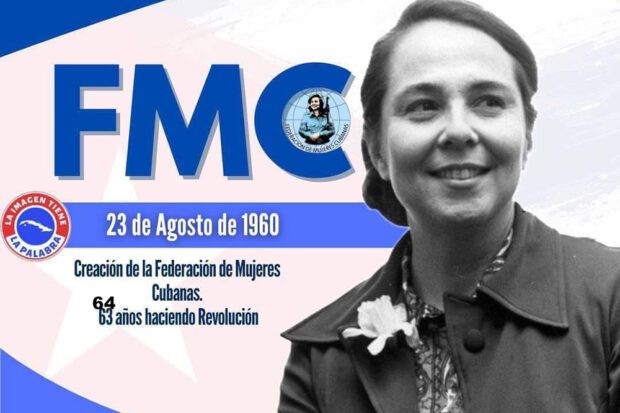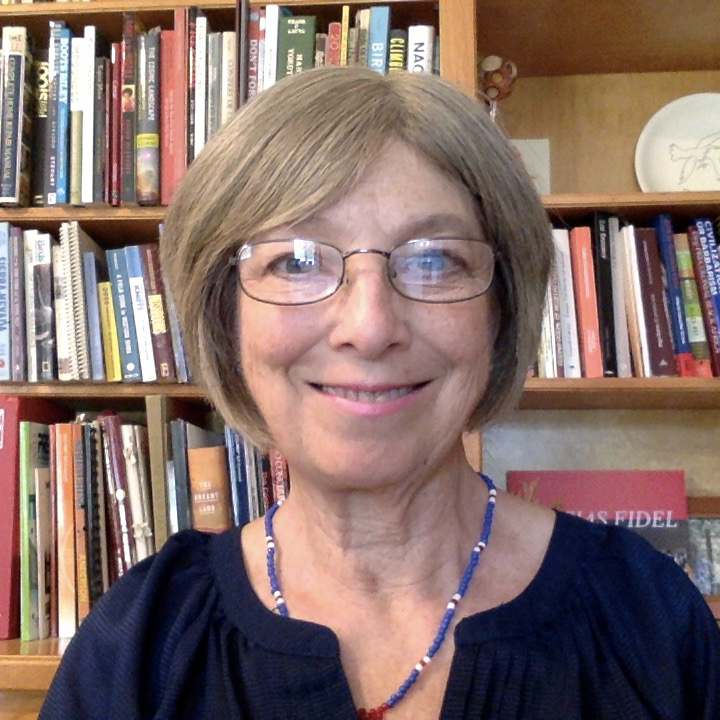
The Federation of Cuban Women (Federación de Mujeres Cubanas, or FMC) was founded on Aug. 23, 1960, only eight months after the triumph of the Cuban Revolution. The leader of the movement for women’s rights in Cuba and founding president of the organization was Vilma Espín.
This born revolutionary graduated in 1954 from the University of Santiago with a degree in chemical engineering. She joined the revolutionary movement in Cuba shortly afterward and was one of the organizers and leaders of the armed uprising in Santiago on Nov. 30, 1956, intended to coincide with and cover for the landing of the boat Granma, bringing Fidel Castro and 81 others to begin the overthrow of the dictator Fulgencio Batista, who had canceled the elections and seized power in 1953.
She remained a leader in the clandestine movement until she was identified by Batista’s forces, then joined the Rebel Army in the Sierra Maestra, in the region of the Second Eastern Front named for Frank País.
After the triumph of the Revolution, she dedicated her life to the struggle of Cuban women for equality. She clearly had great influence on the thinking of other Revolutionary leaders.
At the very hour of the triumph of the Revolution, Jan. 1, 1959, Castro said, speaking of women, “This is a sector of our country that needs to be emancipated, because they are the victims of discrimination in work and other aspects of life…
“When our revolution is judged in the future, one of the questions on which they will judge us will be the way in which, in our society and our country, we have resolved the problems of women, although this is one of the problems for the revolution that requires great tenacity, firmness, constancy and effort.”
In 1960, Espín founded the FMC to defend the same rights for all and to end discrimination; she remained dedicated to the organization until her death. Her life work was to ensure that all women should occupy, finally, the social space that belongs to them and contribute fully to the building of a new country for all.
The FMC began to change the role of women in Cuba, beginning with first aid courses, the incorporation of women into the Milicias Nacionales Revolucionarias (the Revolutionary Militias), and the participation of women and girls in the Literacy Campaign.
There were classes of sewing to give skills to women who had no occupational skills or possibilities, and these gave rise to the national plans to bring adult women “housewives” up to 6th-, then 9th-, grade educational levels, and then to make available higher education and skills education. She organized and headed the Ana Betancourt School for Farmworker Women and the Night Schools for the Advancement of Women Servants.
The FMC has a membership of about 85% of all Cuban women aged 14 and older. The only requirements for membership are to be at least 14 and to want to join. Over the years, the FMC has been successful in creating a social and political atmosphere of support for women’s rights. Some examples follow:
Cuba legalized abortion in 1965. That was eight years before Roe v. Wade in the United States in 1973. It was 23 years before Canada’s equivalent Supreme Court decision. Cuba was the first country in the Western Hemisphere to allow women control over their own bodies.
Within the Cuban free universally accessible community-based healthcare system, termination of pregnancy is a medical procedure available to women without restriction. It is the woman who decides.
Women who choose to have children are supported by this system with excellent prenatal care and community support that have reduced Cuba’s infant mortality rates below those of the United States. The difference is even more marked for Black infants.
Parental leave rights are also guaranteed; Cuba meets the UNICEF standards for parental leave.
In 1979, the UN General Assembly approved the Convention on the Elimination of All Forms of Discrimination Against Women (CEDAW) and Cuba immediately signed and ratified this. Even prior to this, all discrimination against women had been outlawed by the Cuban Constitution. These protections have only been strengthened and increased in subsequent Cuban constitutions, most recently in 2019.
Cuba has created and passed by referendum in 2022 a legal code that includes the protection of the right of all people to form a family without discrimination, that updates the legal definition of family institutions with inclusive rather than strictly heteronormative models, that establishes the right to a family life free from violence, that treats children as the responsibility of their parents rather than as possessions and that centers values of love, affection, solidarity and responsibility.
Espín died in 2007. Her remains are in the Mausoleo de los combatientes del II Frente Frank País in Mayarí Arriba, in a simple rock tomb, which the author had the opportunity to visit on July 26. The FMC lives on and is celebrating its 64th year.
Current Secretary General Teresa Amarelle Boué recently said, “We are not satisfied with what has been achieved, and we need to continue to move forward, to close the gender gaps that still survive.” The history of the FMC indicates that it will indeed continue to move forward.
(Author’s note: I am grateful to Nora Cuello, one of the initial founding members of the Federación de Mujeres Cubanas in 1960, for her contributions to this article.)

